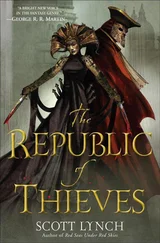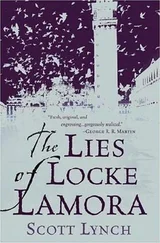Locke stood before the full-length mirror in his suite at the Villa Verdante, wearing nothing but his breeches and a light tunic of fine silk. The cuffs of the tunic were drawn away from his wrists and he stared intently at his own reflection.
"It would, of course, be impossible for me to produce a deck of cards from thin air… but what's this?"
He moved his right hand toward the mirror with a flourish, and a deck of cards slipped clumsily out of it, coming apart in a fluttering mess as it fell to the floor. "Oh, fucking hell," Locke muttered.
He had a week of empty time on his hands, and his legerdemain was improving with torturous slowness. Locke soon turned his attention to the curious institution at the heart of Salon Corbeau, the reason so many idle rich made pilgrimage to the place, and the reason so many desperate and downtrodden ate their carriage dust as they trudged to the same destination. They called it the Amusement War.
Lady Saljesca's stadium was a miniature of the legendary Stadia Ultra of Therim Pel, complete with twelve marble idols of the gods gracing the exterior in high stone niches. Ravens perched on their divine heads and shoulders, cawing half-heartedly down at the bustling crowd around the gates. As he made his way through the tumult, Locke noted every species of attendant known to man. There were physikers clucking over the elderly, litter-bearers hauling the infirm (or the unabashedly lazy), musicians and jugglers, guards, translators and dozens of men and women waving fans or hoisting wide silk parasols, looking like nothing so much as fragile human-sized mushrooms as they chased their patrons under the growing morning sun.
While it was said that the floor of the Imperial Arena had been too wide for even the strongest archer to send an arrow across, the floor of Saljesca's re-creation was just fifty yards in diameter. There were no common seats; the smooth stone walls rose twenty feet above the smooth stone floor and were topped with luxury galleries whose cloth sunscreens flapped gently in the breeze. Three times per day, Lady Saljesca's liveried guards would open the public gates to the better class of Salon Corbeau's visitors. There was a single standing gallery (which even had a decent view) to which admission was free, but the vast majority of spectators at the stadium would take nothing less than the luxury seats and boxes that needed to be reserved at some considerable expense. Unfashionable as it was, Locke elected to stand for his first visit to the Amusement War. A relative nonentity like Mordavi Fehrwight had no reputation to protect.
On the floor of the arena was a gleaming grid of black and white marble squares, each one a yard on a side. The squares were set twenty by twenty, like a gigantic Catch-the-Duke board. Where little carved pieces of wood or ivory were used in that game, Saljesca's playing field featured living pieces. The poor and destitute would man that field, forty to a side, wearing white or black tabards to distinguish themselves. This strange employment was the reason they risked the long, hard trudge to Salon Corbeau.
Locke had already discovered that there were two large barracks behind Lady Saljesca's stadium, heavily guarded, where the poor were taken upon arrival in Salon Corbeau. There they were made to clean themselves up, and were given two simple meals a day for the duration of their stay, which could be indefinite. Each "aspirant", as they were known, was assigned a number. Three times per day, random drawings were held to select two teams of forty for the coming Amusement War. The only rule of the War was that the living pieces had to be able to stand, move and obey orders; children of eight or nine were about the youngest taken. Those that refused to participate when their number was drawn, even once, were thrown out of Saljesca's demi-city immediately and barred from returning. Without supplies and preparation, being cast out onto the roads in this dry land could be a death sentence.
The aspirants were marched into the arena by two dozen of Saljesca's guards, who were armed with curved shields and lacquered wooden sticks. They were robust men and women who moved with the easy assurance of hard experience; even a general uprising of the aspirants would stand no chance against them. The guards lined the aspirants up in their starting positions on the board, forty white "pieces" and forty black "pieces", with sixteen rows of squares separating each double-ranked army.
At opposite ends of the stadium were two special gallery boxes, one draped with black silk curtains and the other with white. These boxes were reserved far in advance by a waiting list, much as patrons of a chance-house would lay claim to billiard tables or private rooms at certain hours. Whoever reserved a box gained the right to absolute command of that colour for the duration of a War.
That morning's White Warmistress was a young Lashani viscountess whose retinue looked as nervous with the affair as she was enthusiastic; they appeared to be scribbling notes and consulting charts. The Black Warmaster was a middle-aged Iridani with the well-fed, calculating look of a prosperous merchant. He had a young son and daughter with him in his gallery.
Although the living pieces could be hung (by the agreement of both players) with special tabards that gave them unusual privileges or movement allowances, the rules of this particular Amusement War appeared to be plain Catch-the-Duke with no variations. The controllers began calling orders and the game slowly developed, with white and black pieces trudging nervously toward one another, very gradually closing the distance between the opposing forces. Locke found himself puzzled by the reaction of the stadium crowd.
There were easily sixty or seventy spectators in the boxes, with twice as many servants, bodyguards, assistants and messengers on hand, not to mention caterers in Saljesca's livery hurrying to and fro to serve their wants. Their buzz of eager anticipation seemed totally incongruous given the plodding nature of the contest shaping up on the squares.
"What," Locke muttered to himself in Vadran, "is so damn fascinating?"
Then the first piece was taken, and the Demons came out to the arena floor.
The White Warmistress deliberately placed one of her "pieces", a middle-aged man, in harm's way. More of her army lurked behind him in an obvious trap, but the Black Warmaster apparently decided it was a worthwhile exchange. Under the shouted orders of the Black Adjutant, a teenaged girl in black stepped from a diagonal square and touched the middle-aged man on the shoulder. He hung his head, and the appreciative clapping of the crowd was drowned out a moment later by a wild shrieking that arose from the far left side of Locke's view of the stadium.
Six men ran onto the arena floor from a side portal, dressed in elaborate leather costumes with black and orange fluting; their faces were covered with grotesque flame-orange masks trailing wild manes of black hair. They threw their arms in the air, screaming and hollering meaninglessly, and the crowd cheered back as they ran across the arena toward the cringing man in white. The Demons seized him by the arms and by the hair; he was thrust, sobbing, to the side of the game board and exhibited to the crowd like a sacrificial animal. One of the Demons, a man with a booming voice, pointed to the Black Warmaster and shouted: "Cry the default!" "I want to cry it," said the little boy in the merchant's gallery.
"We agreed that your sister would go first. Theodora, name the default." The little girl peered down to the arena floor in concentration, then whispered up to her father. He cleared his throat and shouted, "She wants the guards to beat him with their clubs. On his legs!"
And so it was: the Demons held the writhing, screaming man with his limbs spread while two guards obligingly laid into him. The fall of their sticks echoed across the arena; they thoroughly bruised his thighs, shins and calves until the chief Demon waved his hands to clear them off. The audience applauded politely (though not with particular enthusiasm, noted Locke), and the Demons hauled the quivering, bleeding man off the stadium floor.
Читать дальше












